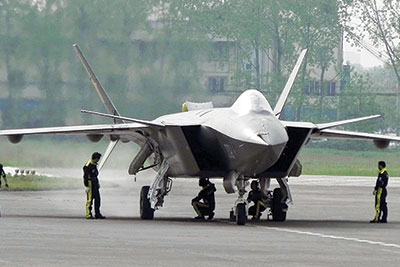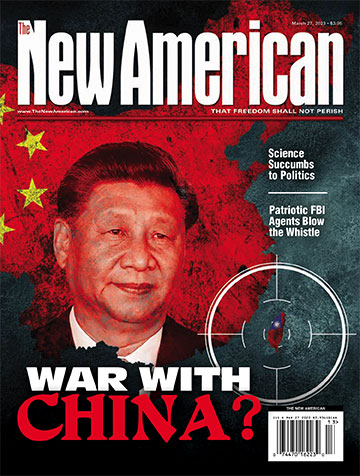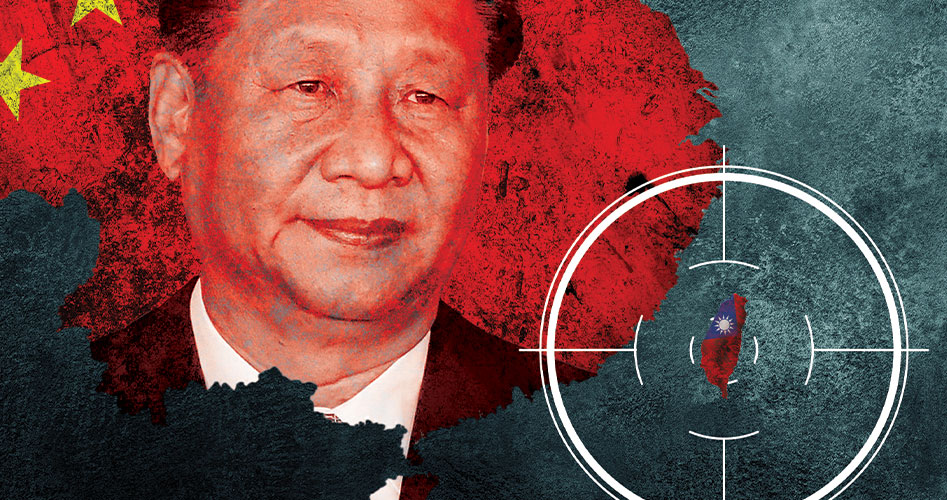War With China?
On July 27 of last year, General Mike Minihan, a four-star general who heads the Air Force’s Air Mobility Command, sent a memo to all his officers predicting war with China in 2025, and instructing them to report back by February 28 on the steps they will take to ensure that they will be ready to fight “inside the first island chain.” Tellingly, he also advised the men under his command to make sure their emergency contact information and legal affairs were up-to-date. Minihan added, “I hope I am wrong. My gut tells me [we] will fight in 2025.” After news of the memorandum broke, several members of Congress agreed with Minihan, while the Biden Defense Department took a different stance, pointing out to Fox News that Minihan’s statements were “not representative of the department’s view on China.”
What are we to make of such contradictory predictions? Until recently, conventional wisdom held that any Chinese attempt on Taiwan was at least 10 to 15 years in the future. But recently, China’s dictator Xi Jinping has conducted almost daily acts of military aggression against Taiwan, coupled with a massive military buildup and frequent not-so-veiled threats against both Taiwan and the United States. It is very clear what the Chinese Communist Party (CCP) intends to do, and the threat is imminent. But what are China’s prospects for conquering the independent island republic, and should the United States get involved?
The Modern Reality
The history of China and Taiwan is long and complex, but in spite of all the setbacks, betrayals, twists, and turns, the modern-day reality is that Taiwan has become one of the world’s freest, most prosperous, and most successful states. For more than 40 years, the United States and the rest of the Western world have tried to have their cake and eat it too, leaving the question of Taiwan’s sovereignty ambiguous to placate Communist China, while enjoying the fruits of trade and investment with both countries. Along with the diplomatic and political ambiguities related to the “Taiwan question,” the United States until recently had a policy of “strategic ambiguity,” whereby we promised to keep Taiwan supplied with defensive weapons, but left hazy the question of what we would do in the event of an attempted Chinese invasion.
For a long time, as China languished in economic and military impotence, the strategy maintained the status quo. But with China’s recent rapid military development and clear aggressive intent toward Taiwan, it has become clear that old geopolitical strategies are no longer working.
First of all, how likely is a successful Chinese invasion of Taiwan? A much-publicized recent study by the Center for Strategic and International Studies (CSIS) wargaming various Taiwan invasion scenarios concluded that a Chinese invasion of Taiwan would likely fail, but not before inflicting huge casualties on American forces in the region and on Taiwan itself. The study also concluded that only with foreign help could China be thwarted. But it is worth taking a closer look.
The island of Taiwan itself is a natural fortress, with the western coast (the side facing mainland China) having virtually no beaches and lots of broad mud flats — in other words, it would be very difficult for any amphibious landing. The few stretches of sandy beach that do exist are heavily defended, and would present extremely difficult obstacles for successfully landing troops and materiel. Taiwan’s remote east coast, meanwhile, is mostly cliffs and steep tropical slopes plunging into the Pacific Ocean. Moreover, the seas surrounding Taiwan are extremely rough and difficult, with only two feasible “invasion windows” each year, the months of April-May and October. The interior of the island is mountainous and heavily forested, and would be extremely difficult for any invading force to control.
Fortress Formosa: Most of the coastline of Taiwan, formerly known as Formosa (“the beautiful”), is rugged and rocky, lacking beaches and other types of shores amenable to invasion by sea. Despite the size and resources of Communist China, the task of launching a successful invasion of the free island is a daunting one. (shih-wei/iStock/Getty Images Plus)

Because of these factors, American-led Allied forces decided against trying to invade Taiwan during World War II, opting instead for a smaller island-hopping campaign. At the time, the entire island was defended by roughly 40,000 Japanese troops, but the U.S. command estimated that a minimum invasion force of 400,000 Marines would be required for a successful invasion. By all modern estimates, a Chinese invasion of Taiwan would require at least 1,000,000 men, or roughly half of the entire Chinese military.
From the Chinese perspective, invading Taiwan with any hope of success would require an enormous number of ships, planes, tanks, and men. The problem with that is that large numbers of Chinese military assets are required elsewhere to fend off China’s many hostile neighbors (especially India) and maintain the suppression of restive captive populations such as the Tibetans. If China were to draw down its forces in the Tibetan Plateau and along the huge Line of Control that forms the boundary with India, it would face the immediate prospect of local uprisings and Indian reprisals for decades of Chinese encroachment on Indian territory. A Tibetan war for independence or an Indian invasion of the “Aksai Chin” territory seized by China in 1962 would spell disaster for the Beijing regime. The amount of armaments actually available for deployment against Taiwan and her allies would therefore be substantially less. For example, China has roughly 1,600 fighter jets, against only 400 for Taiwan — but whereas the latter would be “all in,” the number of fighters China could actually deploy without leaving other tense borders undefended would probably be about half their total number, equating to a theater advantage of closer to two to one in fighter aircraft. Although still a formidable advantage, two to one is by no means insurmountable, especially given the probable superiority of Taiwan’s aircraft and munitions.
Then there’s the matter of China’s navy. Unofficially, China now has the world’s largest navy, as breathless media fear-mongers never tire of reminding us. But that number includes smaller cutters and other craft. China fields only two rather outdated aircraft carriers (with a third, more modern carrier completed but not yet deployed) and nine nuclear submarines, neither type of ship being of much use in amphibious operations. And against the American or Japanese navies, the Chinese would fall far short. While the U.S. and Japanese have not been involved in complex naval battles involving carrier groups and the like for decades, the institutional experience is still there. And U.S. forces overall have a huge amount of experience in actual modern warfare, whereas China has none.
But even if none of this were true, China still faces a huge logistical problem: how to transport the needed hundreds of thousands of men and tanks across the 90 miles of the Taiwan Strait and land them on Taiwan. In this day of all-seeing satellites, a surprise D-Day-style invasion would be impossible; Taiwan and the United States would have weeks of warning that an invasion was coming, and could prepare accordingly. Not only that, but China has nowhere near the hundreds of transport ships that would be needed to ferry a million-man force across the strait. As a result, given present military capabilities and the geographical circumstances of Taiwan, a successful frontal invasion of the main island of Taiwan would likely be impossible.
What About America?
The other major issue in play, from the point of view of China, is what to do about the United States. There would be two options, namely, either launch an operation against Taiwan and hope the United States (and Japan) would stay out of it for lack of stomach, or preemptively launch strikes against U.S. assets in the area, especially on Okinawa and Guam, to knock U.S. forces out of the conflict. Neither of these scenarios would be particularly appetizing for Chinese forces. On the one hand, starting a war and hoping the United States would stay out of it — particularly after President Biden has effectively ended the policy of strategic ambiguity by declaring, on four separate occasions, that the United States would defend Taiwan in the event of an invasion attempt — would be extremely risky and probably delusional. On the other hand, launching a massive preemptive strike against U.S. forces would certainly inflict major defeats on the United States, as the Japanese once did at Pearl Harbor and in the Philippines. But the Chinese are well aware of what happened to Japan in the long run, and are surely aware that an unprovoked attack on U.S. bases would be as clear-cut a casus belli as the United States has ever seen. Add to that the rapidly diminishing goodwill toward China, thanks to Covid, continuous hostile rhetoric toward the United States, dishonest business and trade practices, etc., and there is little doubt that the U.S. could find plenty of incentive to go to war with China in the event of a confrontation.
Taken in the aggregate, the scenario of a frontal assault-style invasion of Taiwan appears to be a lose-lose proposition for China for the foreseeable future. Taiwan is already massively beefing up defense forces, and the United States has taken steps to “pivot to the Pacific” by withdrawing, however indecorously, from the Afghan quagmire, and working to distribute forces more widely across the Pacific, making them less vulnerable to a catastrophic surprise attack. Moreover, the entire American military and political establishment is focusing on deterring a third world war over Taiwan, or, failing that, to win such an engagement decisively. In fact, the need to defend Taiwan is almost the only issue on which both Democrats and Republicans wholeheartedly agree.
But China has other options beyond a D-Day-style invasion of Taiwan itself. The two most feasible would be either an operation to seize one or more of Taiwan’s outlying islands, such as Quemoy and Matsu near the Chinese coast, or tiny Pratas Island in the South China Sea, or a blockade of the island to throttle its economy and sap its will and ability to resist.
Among Taiwan’s outlying islands, Pratas is garrisoned by several hundred Taiwanese troops, but could probably be taken quickly and with little warning if China airlifted several thousand well-trained troops, under cover of heavy bombardment from sea and air, before anyone even knew what was happening. Quemoy and Matsu, within a couple miles of the Chinese mainland, would also be doable. For any of these smaller-operation scenarios, the element of surprise might be achievable. Much more difficult, but still perhaps feasible, would be seizure of the Penghu Islands in the middle of the strait. Any of these scenarios would have the threefold effect of allowing China to present the United States with a fait accompli, to acquire territory closer to Taiwan that could be used for forward staging in a later operation, and to allow Xi Jinping and the Communist Party to retain legitimacy by saving face. The seizure of a small outlying island or islands would likely be successful, and would be very much in keeping with the characteristic Chinese strategy of “salami slicing,” i.e., nibbling away at little pieces of territory while never committing any aggression egregious enough to trigger all-out war. The strategy has worked well against India, Nepal, and Bhutan in the Himalayas, and would probably allow them to seize some Taiwanese territory without drawing in the United States or other powers.
The downside to any such half-measure, however, would be the risk of severe economic, financial, and diplomatic repercussions. The United States and other countries might decide to sanction China, or re-establish official diplomatic ties with Taiwan, or even set up military bases on the island in response to such clear aggression. After all, unlike the remote areas of the Himalayas contested by India and China, Quemoy, Matsu, and the Penghu Islands all have large civilian populations, complete with towns, roads, power infrastructure, and the like. Conquest of any of them would unavoidably involve civilian casualties and the inevitable repression afterwards.
The other option available for Communist China would be a military blockade of the island, to starve Taiwan into submission, as it were. Such a blockade could be initiated without any attacks against U.S. forces or against Taiwan itself, while making sure that no ships visited Taiwan. Under such conditions, it might be less likely that the United States would intervene forcibly, since China could claim that it had taken no action against us. Any military force initiated against Chinese ships or planes could then be portrayed by the CCP as naked aggression, and there is little doubt that they would find sympathizers around the world.
On the other hand, any blockade could be portrayed by the United States as an illegal attempt to close important international waters, especially the Strait of Taiwan, to commercial shipping. The United States could then send a naval task force to confront China, under the pretext of protecting freedom of navigation.
How Formidable Is China?
But how formidable would China actually be, in the event of all-out war? Assessments of China’s actual military prowess vary widely, with some think-tank analysts seeing China as an almost invincible juggernaut, at least on the Chinese side of the Pacific, and others regarding the People’s Liberation Army as a paper tiger (or paper dragon, as the case may be). China does seem to possess some hypersonic anti-ship missiles with the potential to inflict damage on U.S. Naval forces, as well as other types of conventional missiles with the supposed ability to wreak havoc on U.S. military bases in the region. China’s vaunted Chengdu J-20 fighter aircraft, which entered service in 2017, has stealth capabilities and is regarded as the world’s third fifth-generation fighter aircraft, after the F-22 and the F-35. Finally, China possesses a nuclear arsenal of indeterminate size, but which probably includes 200-400 total warheads, with at least 60 operational ICBMs. Although the size and composition of China’s nuclear stockpile is a closely guarded secret, the country appears to have the ability to deliver nuclear weapons to America, though the quality and quantity of its nuclear weapons is far exceeded by the stockpiles of both the United States and Russia — for now.

New generation: China’s new J-20 fighter jet is the first so-called fifth-generation fighter jet to be developed outside the United States, and is said to possess an impressive range of stealth and advanced combat features. (AP Images)
However, China’s military suffers from at least three major systemic defects compared to America’s. First, China has no combat experience fighting with modern weapons. Its last war, an attempt to seize territory from Vietnam in 1979, ended in humiliating defeat for China after only a few weeks of fighting. Second, much of China’s military equipment — like much of its manufactured electronics, appliances, computers, cellphones, and so forth — is based on technology stolen or pirated from the West. However, China is far behind the West in understanding how to actually use such modern systems, and how to integrate them with one another. Third, critical sciences and technologies in China, such as materials science, lag far behind Western standards — which is why Chinese-made appliances are not very durable, and many Chinese buildings literally fall apart only a few years after construction. For people living in China, even comparatively simple appliances such as portable electric heaters and floor lamps need to be replaced frequently, often after only a few weeks of use. This is because, while blueprints and designs can be copied and knocked off, the materials that compose things — in all their resistance to heat, cold and water, in their flexibility, in their tensile strength, and so forth — cannot. It is highly doubtful that even China’s most advanced fighter jet would have anywhere near the durability and reliability of its Western counterparts.
It has been claimed that the United States has not had any experience fighting naval engagements against peer competitors since World War II, and that therefore it is more or less on a par with China. But both the United States and Japan, thanks to World War II, have enormous experience fighting naval engagements using carrier task forces and submarines, the knowledge of which is retained in those nations’ respective military traditions, even if the level of technology has improved enormously since Midway, Iwo Jima, and Guadalcanal. China, by contrast, has never fought in a modern naval engagement of any kind. Also, modern militaries and military exercises have been proven effective at resuscitating long-dormant forms of theater warfare. In the First Gulf War, for example, American tanks and anti-tank planes faced off against Iraq’s huge tank battalions in the first major tank battle since World War II — and completely annihilated the outclassed Iraqi tanks and their less-than-competent leadership. And Iraq — unlike modern China — had just emerged from a long, bitter war with Iran. Those who remember the Persian Gulf War will also remember all the fearmongering in the American press over Saddam Hussein’s million-man army with all of its battle-hardened veterans. Yet when the war broke out, American and allied forces pummeled Iraq into submission in a few weeks, shooting Iraqi missiles out of the sky and destroying almost every Iraqi tank and aircraft. So superior was Western equipment over Iraq’s mostly Russian and Chinese weaponry that even inexperienced pilots from smaller countries, such as Saudi Arabia, had no trouble shooting down Iraqi jets while flying American and European aircraft.
To be sure, China is more formidable than 1990s Iraq. And the U.S. military has since suffered from alarming drawdowns of manpower and materiel. But the gap between the United States and China is still very substantial.
White-paper woes: The “White Paper” demonstrations late last year were the largest mass protests in China since Tiananmen Square in 1989. Holding up blank pieces of paper to represent their lack of a voice owing to suffocating censorship and repression, tens of thousands in many Chinese cities turned out to demand the ouster of Xi Jinping and the end of CCP rule. Most of the protesters have since disappeared, and will probably never be seen again. (AP Images)

What Should We Do?
All of this raises the question: Should the United States defend Taiwan? Taiwan is an integral part of the “free world,” the lineal descendant of one of America’s staunchest allies in the Second World War. The United States and its allies defeated Japan and liberated China at enormous cost, and in the wake of that ruinous conflict helped to set up a modern system of trade and security that guaranteed open sea lanes between East and West. It also liberated half of Korea from Chinese communist domination in the Korean War, and brought South Korea, in addition to Japan and the Philippines, under American military protection, including the nuclear umbrella. For a time, Taiwan was under that same guarantee of protection. The United States also has one state and two territories in the central and western Pacific, as well as two additional allies in Australia and New Zealand.
Under U.S. protection, the western Pacific rim has seen the greatest economic surge in human history. Japan has been a model country since World War II, renouncing both its former militarism and extreme isolationism. It is hard to imagine a modern world without Japanese contributions, and South Korea is not far behind. The Philippines, meanwhile, have had challenges, but remain Asia’s only majority Christian country, with very deep ties to the United States. Thousands of ships pass through the South China Sea and the Taiwan Strait every month, along the world’s busiest trading route. And at the center of it all sits Taiwan, the key to maintaining this state of affairs.
Make no mistake about it: Communist China is the most repressive regime in human history, even if her atrocities are mostly kept discreetly hidden from view these days. Besides the Uighurs, countless hundreds of thousands of Christians have been disappeared permanently. Tens of thousands of participants in the recent “White Paper” peaceful demonstrations have also been disappeared by the government. So oppressive has Communist China become under Xi Jinping that it has earned the uncomplimentary nickname “West Korea” among the few remaining resident foreigners.
China has already shown the world what its promises are worth in the Hong Kong crackdown. Thousands of formerly free Hong Kongers have been arrested as the brutal darkness of communist tyranny is inflicted on what was only a few years ago one of the world’s freest places. A similar fate awaits the people of Taiwan, should China prevail.
Although most Americans are unaware of it, the Chinese government not only claims the entirety of the South China Sea and Taiwan, but also the East China Sea. Older Chinese maps from the 20th century show territorial claims that include all of mainland southeast Asia, including Singapore; northern Borneo and the Sulu Archipelago of the Philippines; the Ryukyu Islands of southern Japan (including Okinawa); eastern Russia, including Sakhalin Island and most of Yakutia; all of Mongolia; most of Kazakhstan and central Asia, including the Aral Sea and Transoxiania; all of Afghanistan; all of Himalayan India; and all of Bhutan and Nepal. Altogether this would be an area at least as large as all of North America. Moreover, if China seized control of the eastern sea route from Singapore to Japan, the days of free navigation would be over. And conquest of Taiwan would enable China to break out of the natural barrier of the “first island chain” and assert control over the entire western Pacific.
Moreover, those who have not spent time in China have little idea of how loudly the drums of war are constantly beating there. The Chinese are told by their government every day that the United States is their mortal enemy, and that someday soon they will go forth and destroy the United States, allowing the Chinese Communist Party to become the uncontested global hegemon. All through the Covid pandemic, the Chinese people were constantly told that foreign subversives were to blame, and that all of the lockdowns and regimentation were necessary to prepare for war with the United States. In other words, regardless of China’s diplomatic pretensions, they already consider themselves to be at war with the United States, and are only waiting for the proper time to strike. In addition, the Chinese Communist Party — unlike Western governments — has little fear of nuclear war, because it values human life so little. As Mao Zedong callously declared as far back as 1957, “I’m not afraid of nuclear war. There are 2.7 billion people in the world; it doesn’t matter if some are killed. China has a population of 600 million; even if half of them are killed, there are still 300 million people left.” Xi Jinping, who fancies himself Mao’s heir-apparent, is doubtless of a similar mindset.
It is clear that, barring a miraculous turn in world events, the United States and Communist China are headed toward war, a war the Communist Party wants and is preparing for. When the attack on Taiwan comes, the CCP may remove all ambiguity with a preemptive attack on the United States. But even if it does not, the mandate to defend Taiwan — the key to maintaining a free and open Pacific, as well as America’s status as the leader of the free world — is very clear. The coming war with Communist China will not be some feckless foreign adventure in a part of the Earth with which we have little to do. It will be a test of whether the modern free world can survive, at least on the Pacific half of the planet — or whether it will revert to the darkness, violence, and tyranny of ages past.



